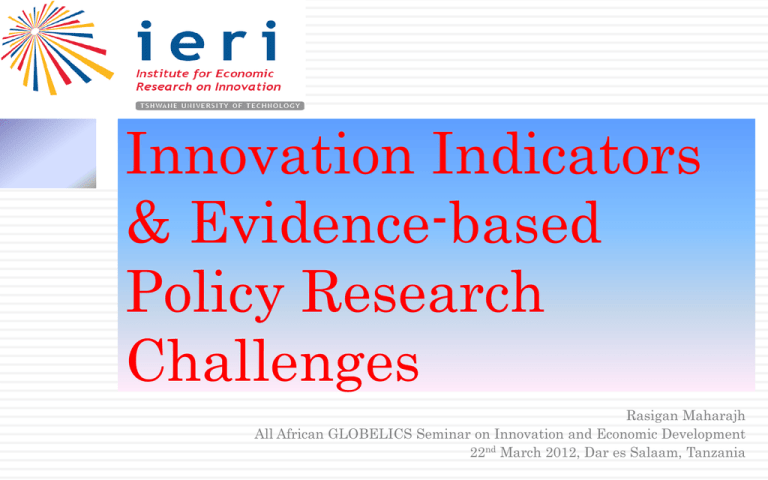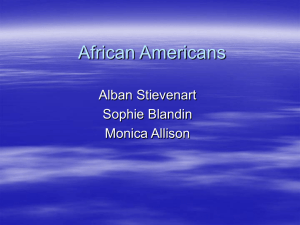Economic Growth and Human Development in Africa
advertisement

Innovation Indicators & Evidence-based Policy Research Challenges Rasigan Maharajh All African GLOBELICS Seminar on Innovation and Economic Development 22nd March 2012, Dar es Salaam, Tanzania Outline of Presentation Introduction 1. 2. 3. Monitoring, Evaluation and Learning of International Collaboration African Innovation Outlook Emergent Lessons Future Research Challenges Introduction Classical: Smith, List, & Marx Evolutionary Economics: Nelson and Winter (1982), Dosi et al (1988), Lundvall (1992), & Freeman (1993) Growing recognition of the historical and structural specificities of NSI’s Global Political Economy & the International Division of Labour STI can serve to entrench current structures Breaking Tragic Trajectories Poorly developed industrial base, small populations with limited purchasing power and impoverished reproductive basis for human capital development strongly militates against the probabilities of developing sufficient local competences in the free trade era The continent, as a whole, however has the possibilities for breaking out of the poverty trap, in spite of the formidable political and institutional obstacles on the way to viable integration. “the necessary overrides the improbable” Muchie et al (2003) CoFISA Learning Ensure that softer aspects such as ‘changed mindsets’, the ‘gap’ between strategy and implementation, and the creation of innovation networks are accommodated by the ME&L function. The measurement of innovation is still in its infancy, and internationally innovation experts are grappling with how to measure it in an appropriate and meaningful way. There are no existing indicators which allow for the measurement of changed mindsets, yet this has been quoted by key stakeholders as one of the major positive outcomes of COFISA. Likewise, the creation of innovation networks and communities of practice has been quoted as a significant outcome of the programme. Mechanisms need to be developed that can assess these parameters more comprehensively and accurately. Given the low levels of awareness about innovation and innovation systems in South Africa, a mechanism to measure progress will have broad beneficial use for future programmes undertaking ME&L activities. James (2010) AIO Chapter Two Economic growth - development programmes - seek to improve the quality of life of the general population Rising rates of change unaccompanied by any significant improvement in most of the indicators of human development & ‘jobless growth’ Growing gap between Africa, & especially sub-Saharan Africa, and most of the rest of the world in the evolution of economic systems and the ensuing trading and investment patterns Entrenching the decoupling of economic growth and human development within the structure of most African economies Questioning Fundamentals “Unless we reject the myth of heroic individual entrepreneurs and help … build institutions and organizations of collective entrepreneurship, we will never see the poor countries grow out of poverty on a sustainable basis” Ha-Joon Chang (2010) Poverty, Entrepreneurship, and Development, accessed at: http://www.wider.unu.edu/publications/newsletter/articles-2010/en_GB/10-2010-Chang/ Translating of entrepreneurship into general welfare also requires a comprehensive and effectively enforced regulatory framework Solid institutional foundations allow for leveraging entrepreneurship Socio-political demands & constraints of political economy Recognition of inherent limitations of state and government agencies Questioning Orthodoxies “big push” theory of economic development balanced growth the interdependence of sectors, especially in terms of consumption power, within a closed economy framework unbalanced growth priorities assigned on the basis of industrial linkages and potential spill-over and multiplier effects Picking / Selecting Winners – Can we predict future states on the basis of current ones? “imagining the future” – Science and Technology Foresight Measuring Progress … growth has mostly not been the rapid, sustained and inclusive growth that is key to lifting people out of poverty. Economic growth has been robust largely in countries with enclave resources such as oil and minerals. With few exceptions, the fruits of such growth have not been widely shared with the poor. … many States have only weak capacity to carry out their basic functions and are not investing sufficiently in key social sectors such as education, health, water and sanitation. … HIV/AIDS … aggravated weak economic growth in many countries and is depleting human capital, the very foundation of social development. Inequality, Discrimination & Conflict (UNECA, 2010, p. 13) We recognize that more attention should be given to Africa, especially those countries most off track to achieve the Millennium Development Goals by 2015. Progress has been made in some African countries, but the situation in others remains a grave concern, not least because the continent is among the hardest hit by the financial and economic crisis. We note that aid to Africa has increased in recent years; however, it still lags behind the commitments that have been made. We therefore strongly call for the delivery of those commitments. High-level Plenary Meeting, General Assembly, United Nations, 64th Session (A/65/L.1) Emergent Lessons Traditional definitions limit the scope of Policies by constraining Institutions Complex interdependencies underpin NSI’s Uneven spread of STI institutions across the continent High degree (sic) of differentiation & the contradictory demand for generic best practices Dangers of isolated indicators Research Agenda Building Long term structural transformation process What are the appropriate conditions for broad based human development & linkages to the economy Structuring relationships between Innovation, Fiscal & Monetary policy determinations Transparency, good governance & participation Supporting Africa-wide Communities of Practice in evidence based policy research Praxis-informed Learning, Education & Training Futures Research … Need to re-encourage local economic histories Path dependencies and trajectories Critical political economy Creative Destruction (+ & -)’s Improving Institutions Broadly Participative, Transparent & encouraging Universal Access to Data, Statistics & Indicators Innovation Systems Policy Harmonisation & Coordination References Chang, Ha-Joon (2010) Poverty, Entrepreneurship, and Development, UNU-WIDER, Helsinki. James, Tina (2010) Enhancing Innovation in South Africa: The COFISA Experience, Department of Science & Technology, Tshwane. Maharajh, Rasigan & Mario Scerri (2011) Economic Growth and Human Development Challenges for Science, Technology and Innovation in Africa, Chapter 2 in African Union [editor] AFRICAN INNOVATION OUTLOOK 2010, African Union, Addis Ababa. Muchie, Mammo; Peter Gammeltoft & Bengt-Åke Lundvall (2003) Putting Africa First: The Making of African Innovation Systems, Aalborg University Press, Aalborg. Pogue, Thomas E. (2009) Databases supporting South Africa’s National System of Innovation, National Advisory Council on Innovation Project Report, Tshwane. Pogue, Thomas E. & Rasigan Maharajh (2008) South African Science, Technology and Industry Scoreboard 2008, Cooperation Framework on Innovation Systems between Finland and South Africa, Tshwane. Asante sana, …r






